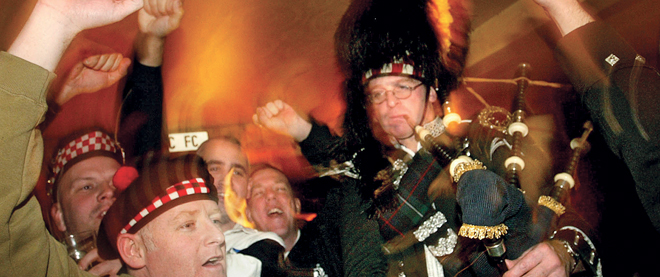Scotland fights alcohol abuse with minimum pricing
Scots are starting to face up to their nation’s drinking problem. But are they willing to pay more for a tipple?
Share

Hogmanay, the annual Scottish New Year’s celebration, is a slice of traditional Celtic bacchanalia at its finest. This year, as in others, hundreds of thousands of jolly, pink-nosed Scots took to the streets of Edinburgh and Glasgow to toast 2012 with a drink or 12. The Scots love a party, and as a result, festivities traditionally last well into New Year’s Day and beyond. But there’s a downside. As Scotland fights off its hangover and confronts the sobering year ahead, the nation’s drinking problem is high on the political agenda.
Solutions on the best course of treatment vary widely, depending on who you talk to. But that there is a problem is not a matter of debate. The numbers are startling: the average Scot drinks more than the government’s weekly recommended limit (21 units for men, 14 units for women), and a staggering 23 per cent more than their Welsh and English brethren—no teetotalers themselves. The number of alcohol-related deaths in Scotland is twice that of its neighbours in the “soft south,” and it’s estimated that excessive drinking costs the country $6 billion and 3,000 lives a year.
In Glasgow, Scotland’s biggest city, a host of new programs was introduced in the lead-up to the holidays. They included a hotline for responsible citizens to report rowdy drunks, and a roving city bus manned by pastors armed with warm clothes, first aid and sober words of wisdom. Meanwhile, a ban on bulk-buying discounts for alcohol sold in Scottish shops and supermarkets took effect in October; by mid-December, Nielsen retail analysts reported that Scottish beer sales had fallen by eight per cent, followed by wine (five per cent) and spirits (three per cent).
But as the ruling Scottish National Party becomes more active in its crusade to attack the problem of so-called “anti-social” drinking, experimental measures are being tested. A U.S.-style program known as “Sobriety 24-7” will fit problem drinkers who agree to sober up with an anklet that measures the level of ethanol in their sweat, alerting authorities to those who’ve hopped off the wagon. The measure is intended as an alternative to jail time for alcohol-related offenders.
While the Scots enjoy a tipple more than most, it’s important to remember the vast majority remain reasonable drinkers. Responsible drinking campaigns and multi-buy bans are aimed at just a small sliver of the population—it’s estimated that 10 per cent of drinkers in Scotland consume a whopping 45 per cent of alcohol sold.
The SNP’s most beloved plan to curb binge drinking is also proving its most controversial. Last fall, Nicola Sturgeon, the Scottish health secretary, introduced a bill that would set minimum pricing for alcoholic beverages, many of which are currently sold in supermarkets at prices lower than juice and pop. The bill is the SNP’s second attempt to up the minimum price of booze (a previously proposed measure was vetoed by opposition parties in 2010), and while it looks like the bill will be passed in the coming months, the exact price floor remains a question mark.
Britain’s Tory-led government currently opposes minimum pricing in Scotland and elsewhere, arguing that it violates EU free trade rules (though there are recent reports that Prime Minister David Cameron might be changing his mind). And Scottish opponents of the bill, including the Scottish Whiskey Association, small shop owners and the Labour opposition, say the bill should be tested in the courts—the Law Society of Scotland agrees, which means lengthy legal delays are likely to ensue.
Kevin McKenna, a Glasgow-based columnist for the Observer, says that while Scotland’s drinking problem certainly exists, it’s also been exaggerated for purely political ends. Minimum pricing, in his view, is a politically expedient Band-Aid solution—one that will penalize responsible folk without giving the problem drinkers a good reason to sober up. “There’s a deeper underlying problem with anti-social drinking, which unfortunately no government wants to tackle because it’s poverty, deprivation and lack of education,” he said in an interview. “For people who live in the most deprived circumstances, any act of celebration also becomes a form of commiseration. The result is a violent behaviour, and in Glasgow, a real problem with knife crime.” According to McKenna, the causes of this dangerous drinking culture are rooted in recent history. “A lot of the most deprived communities in Scotland lost hundreds of thousands of their young in the two world wars. They’ve never really recovered. Cheap drink becomes the only option.”
Like the average Scotsman, McKenna concedes he likes a drink—and he resents being asked to pay more for it. “Minimum pricing is a clumsy and lazy way of dealing with the problem,” he said. “Ninety per cent of Scots drink responsibly, so why should they be penalized for enjoying a bargain?”